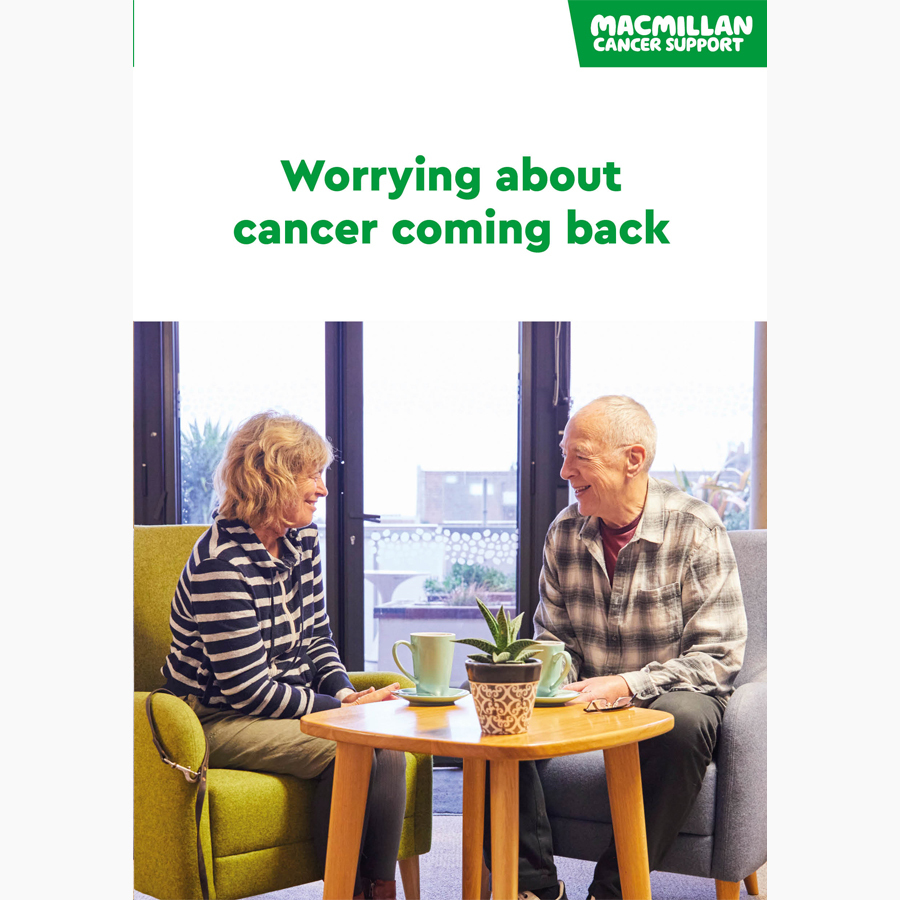Coping with worries about cancer coming back
Feeling worried about cancer
When treatment has finished, it is common to worry that every symptom you have is linked to cancer. You will still be getting used to what is now normal for you. You will also get the same aches and pains as most other people. This can make it hard to know what you need to pay attention to.
Related pages
Knowing about cancer symptoms
Ask your cancer team about:
- any symptoms you should look out for
- possible late effects of treatment and their symptoms.
Knowing more can help you manage any worries you may have. Tell your cancer team if you have any new symptoms, or symptoms like those you had when you were diagnosed.
If there is anything you are not sure about, you can also visit your GP. Your GP can check your symptoms and refer you for advice if needed.
You do not have to wait until your follow-up appointment to contact your cancer team. Make sure you have their contact numbers so you can get in touch with them if you need to. If your symptoms are most likely to be from your treatment, your cancer team can reassure you. They can also arrange to meet you if needed.
If you have been fully discharged by your cancer team, you can contact your GP about any concerns.
It is important to be aware of changes in your body. But constantly checking for symptoms or changes can make you feel anxious. You may do this if you are finding it hard to cope with uncertainty about the cancer coming back. If you find yourself doing this, talk to someone from your cancer team or your primary care team. They can get you the support you need.
Worrying about cancer coming back
Worrying about the cancer coming back is common after treatment. Many people struggle to cope with feelings of uncertainty. It can be hard to deal with these feelings. But they often get better with time.
Certain things may trigger these feelings – for example, going to the hospital for a test or hearing something about cancer in the news.
You can manage worry and uncertainty in different ways. Try not to worry about things that may never happen. Instead, you might find that focusing on what you can control and do now can help. This could include:
- getting involved in your recovery and focusing on your well-being
- talking about your feelings and getting support
- finding ways of managing anxiety and stress
- knowing what your triggers are
- doing activities you enjoyed before treatment, or starting new ones
- going back to work.
If you are feeling worried or finding it difficult to cope, talk to your cancer team, GP or practice nurse. They can give you advice on ways to manage anxiety. They can also refer you to any extra support you may need. Some charities also run programmes on helping people with fear of recurrence.
If cancer comes back after treatment, it is often possible to treat it again. Treatment can often control the cancer, sometimes for many months or years. Treatment to control the cancer is called palliative care. For some people, treatment may aim to get rid of the cancer again. Your cancer doctor or nurse will explain about the possible treatment options.
Support from Macmillan
Macmillan is also here to support you. If you would like to talk, you can do the following:
- Call the Macmillan Support Line for free on 0808 808 00 00.
- Chat to our specialists online.
- Visit our life after cancer forum to connect with people who have been affected by cancer, share your experience, and ask an expert your questions.
Booklets and resources
About our information
This information has been written, revised and edited by Macmillan Cancer Support’s Cancer Information Development team. It has been reviewed by expert medical and health professionals and people living with cancer.
-
References
Below is a sample of the sources used in our after treatment information. If you would like more information about the sources we use, please contact us at cancerinformationteam@macmillan.org.uk
ESMO Expert Consensus Statements on Cancer Survivorship: promoting high-quality survivorship care and research in Europe. Published: 10 August 2022. Annals of Oncology (accessed April 2023).
National Comprehensive Cancer Network. Survivorship: Clinical Practice Guidelines in Oncology. Published: October 2018; 16 (10): 1216–1247.
Date reviewed

Our cancer information meets the PIF TICK quality mark.
This means it is easy to use, up-to-date and based on the latest evidence. Learn more about how we produce our information.
The language we use
We want everyone affected by cancer to feel our information is written for them.
We want our information to be as clear as possible. To do this, we try to:
- use plain English
- explain medical words
- use short sentences
- use illustrations to explain text
- structure the information clearly
- make sure important points are clear.
We use gender-inclusive language and talk to our readers as ‘you’ so that everyone feels included. Where clinically necessary we use the terms ‘men’ and ‘women’ or ‘male’ and ‘female’. For example, we do so when talking about parts of the body or mentioning statistics or research about who is affected.
You can read more about how we produce our information here.





